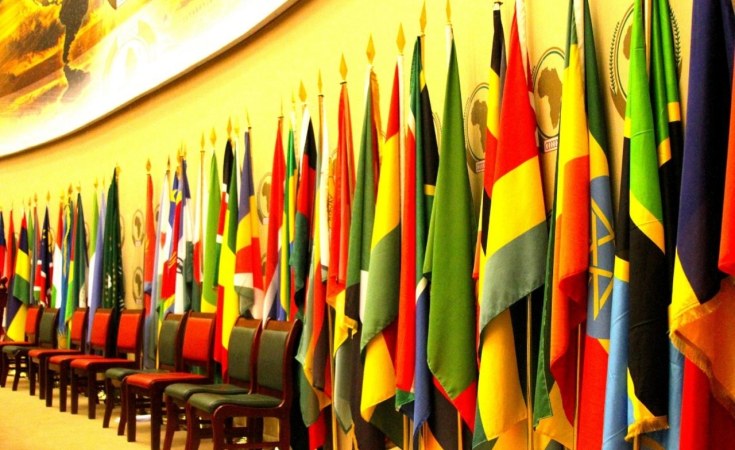Leadership from influential countries can drive reform and progress in Africa and at the African Union.
Should Africa's lead nations - countries with economic and political clout - more actively pursue good governance, peace and stability on the continent? Debates about the big states' responsibility in the African Union (AU) aren't new and remain unresolved.
When the AU was formed out of the Organisation of African Unity in 2002, dynamic leadership from a few major players made all the difference. The creation of the Peace and Security Council (PSC) in 2004 also gave strong states a prominent role.
In the PSC's two-track composition, five countries (one from each region on the continent) serve for three years, and 10 other countries have two-year terms. Some AU founding members saw this as a way to institutionalise the role of influential states while ensuring fair regional rotation for all.
But to date, only Nigeria has kept its lead nation status on the PSC. After North Africa's recent request for another PSC seat (it currently has less than all other regions), questions about the council's composition have re-emerged and should be tackled at this month's AU summit.
Debates about the big states' responsibility in the AU aren't new and remain unresolved
Allowing powerful countries to serve for longer was a consideration when the PSC was set up. It was argued that the two-track approach and seat rotations would prevent the ills of permanent membership, as seen in the United Nations Security Council (UNSC). None of the UNSC's five permanent members can be removed by the General Assembly, even if the context of their appointment changed significantly. The PSC allows for renewal, with rotations every two or three years.
According to a former ambassador present at these early debates, the idea was that countries meeting all the criteria would serve a three-year term, which could be renewed if they upheld the requirements. The criteria in Article 5(2) of the PSC Protocol include upholding AU principles and respecting constitutional governance and the rule of law.
Three-year members were also meant to participate in conflict resolution, peacebuilding and regional peacemaking. They should be able to shoulder the responsibility of PSC membership, including having adequately staffed embassies in Addis Ababa and New York. And they must be fully paid AU members and contribute to the AU Peace Fund.
As has been the case with other founding ideals of the AU, this model has not been comprehensively implemented due to some member states' reluctance to drive change. Since the council's inception, only West Africa has stuck to the two-track principle, with Nigeria serving on the PSC for 18 years.
Only West Africa has stuck to the PSC's two-track principle, with Nigeria serving for 18 years
In other regions, lead nations have rotated on and off the council for various reasons. South Africa did not push for continuous membership. According to the former ambassador, the country was aware of being the new 'kid on the block' and did not want to be seen as flexing its muscles.
North Africa has just two seats, compared to West Africa's four, and three seats each for Southern, East and Central Africa. When the PSC was formed, only two of the six northern countries - Algeria and Libya - had adopted the PSC Protocol. Mauritania, Tunisia and Egypt had not ratified, and Morocco wasn't an AU member. Today all six North African countries are AU members and have ratified the PSC protocol, hence North Africa's push for additional representation.
States are divided over whether North Africa should have another seat - with an additional rotating seat added to ensure uneven numbers - or whether West Africa should give one of its four seats to the northern bloc. At issue is whether another seat would boost the region's most capable state or allow another lead country to take up the mantle. A report on the issue is due to be discussed by the AU's Executive Council of foreign ministers ahead of the February AU summit.
Since its inception, the AU has backed the notion that a small group of willing and able states should lead its initiatives. These include the New Partnership for Africa's Development, the African Peer Review Mechanism and the now-defunct African Capacity for Immediate Response to Crises. This approach was largely successful, even though financing a small group of states proved unsustainable.
States remain divided over whether North Africa should have an additional seat on the PSC
The AU has also appointed 'champions' to implement its goals. These individuals have more time to follow through on decisions than they would as AU chairperson, which is a one-year position. Currently, 16 champions spearhead issues such as the COVID-19 response, climate change, tackling violent extremism and UNSC reform.
Experience has shown that some heads of state take on these positions with gusto, investing much of their time and energy, while others do not. Lead nations need to sustain momentum if they launch interventions, and those elected to the PSC - especially three-year members - must adhere to the membership criteria in the PSC Protocol.
As the AU begins its third decade, powerful states that can drive change should take the lead when major problems arise, whether as semi-permanent PSC members, AU champions or AU chairpersons.
PSC Report team, ISS Addis Ababa
This article was first published in the ISS PSC Report.


